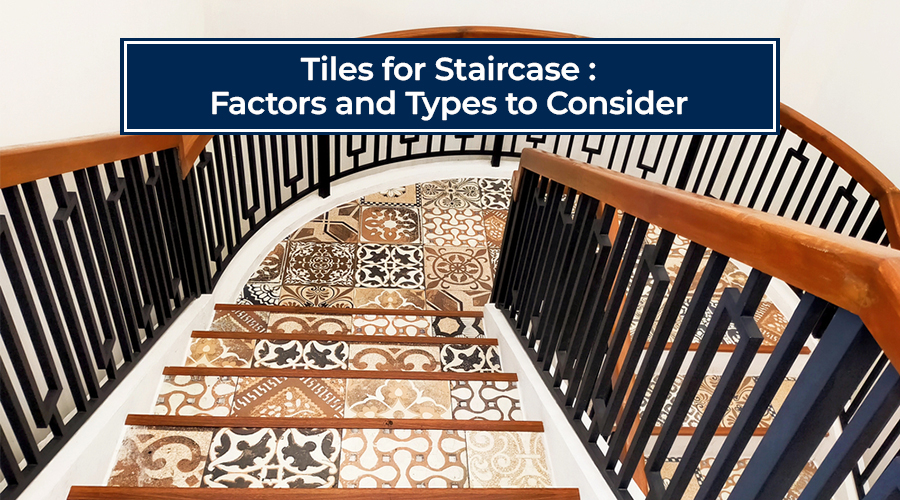Introduction:
Making sure you choose the right tiles for your staircase is essential for both aesthetics and safety. With so many different types of tiles available, it can be difficult to know which ones are the best option for your needs. There are several factors you should take into consideration while selecting tiles for your stairs. These include the type of stairs you have, the environment in which the stairs are located, and the level of foot traffic they will receive. You also want to consider the overall color scheme and design of your space, as well as factors such as durability and slip resistance.
In this guide, we’ll explain everything you need to know about choosing the right tiles for stairs. We’ll discuss why each factor matters and how they can help you make an informed decision when it comes time to purchase tiles.
Tiles for Staircase
When it comes to choosing tiles for stairs, there are two options that are commonly considered: full-body tiles and glazed vitrified tiles. Both categories of tiles have their own unique features and benefits. We will learn about both tiles in detail.
Full-Body Tiles:
Full-body tiles, also known as unglazed tiles, are made of a single color throughout the thickness of the tile. These tiles are made from natural materials such as clay, sand, and other minerals. They are extremely durable and have a high resistance to abrasion, making them suitable for high-traffic areas like staircases. They also have a natural matte finish that gives a rustic look to the stairs.
Pros:
- High durability and abrasion resistance
- A matte finish provides a rustic look
- Highly slip-resistant due to natural texture
- Resistant to stains and scratches
Cons:
- Limited color options
- Can be difficult to clean due to natural texture
Glazed Vitrified Tiles:
Glazed vitrified tiles, also known as GVT or polished tiles, are made by applying a layer of glaze to the surface of the tile. This glaze layer makes the tile waterproof, stain-resistant, and easy to clean. These tiles come in a wide range of colors, designs, and textures, making them a versatile option for stairs. They have a glossy surface that can reflect light, providing a modern look to the stairs.
Pros:
- A wide range of colors, designs, and textures are available
- Highly water-resistant and easy to clean
- Resistant to stains, scratches, and UV rays
- Reflective surfaces provide a modern look to the stairs
Cons:
- Lower abrasion resistance compared to full-body tiles
- Slip-resistant properties can vary based on the texture of the tile
Factors to Consider When Choosing Tiles for Staircase
When choosing tiles for your staircase, there are several factors to consider to ensure you choose the right tiles that provide the necessary functionality and durability for your specific needs. These factors include abrasion resistance, anti-slip properties, high load-bearing capacity, easy maintenance, and anti-skid properties.
Abrasion Resistance:
Abrasion resistance refers to the ability of the tile to resist wear and tear caused by foot traffic over time. Staircases are high-traffic areas, and the tiles used must be able to withstand the constant foot traffic without wearing down quickly. The higher the abrasion resistance, the longer the tiles will last, and the better they will look over time. Tiles with higher abrasion resistance are typically made of harder materials, such as porcelain or natural stone.
Anti-slip:
Anti-slip properties are essential for staircases to prevent accidents and injuries. Tiles that are too smooth can be slippery, particularly when wet. When choosing tiles for your staircase, look for tiles with anti-slip properties, such as textured finishes or tiles with grooves that provide extra grip. These tiles are particularly important for outdoor stairs or stairs that are near water sources such as swimming pools or bathrooms.
Load-bearing Capacity:
Staircase tiles should be able to withstand heavy foot traffic and the weight of people and objects moving up and down the stairs. High load-bearing capacity refers to the amount of weight the tile can withstand without cracking or breaking. When choosing tiles for your staircase, consider the weight they will need to support, including the weight of people, pets, and any objects that may be carried up and down the stairs.
Easy to Maintain:
Staircase tiles should be easy to maintain and keep clean. Tiles that are difficult to clean or that require special cleaning products can become a nuisance over time. Choose tiles that are easy to clean with a simple wipe-down or mopping and that are resistant to staining, scratching, and discoloration.
Anti-skid Property:
The anti-skid property of tiles refers to their ability to provide traction and prevent slips and falls. Tiles that are too smooth or shiny can be slippery and dangerous, particularly for children or elderly people. Anti-skid tiles are typically rougher or have textured surfaces that provide extra grip, preventing slips and falls.
Conclusion
In conclusion, choosing the right tiles for your staircase is essential to ensure the safety, durability, and aesthetic appeal of your home. Above all, it is also important to buy your tiles from a reliable store that sells products without compromising on quality; one such supplier is Builders9, where construction materials can be ordered from the comfort of your home. While ordering, consider factors such as abrasion resistance, anti-slip properties, high load-bearing capacity, easy maintenance, and anti-skid property when making your choice. By choosing tiles that meet these requirements, you can create a safe and functional staircase that complements the design aesthetic of your home.

